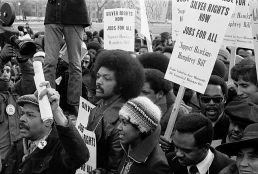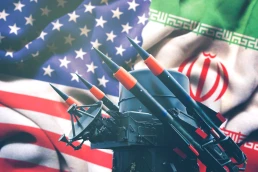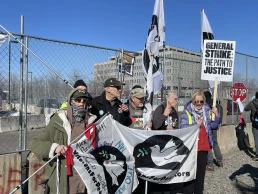Interviews By Olivia DiNucci
The resistance to stop the Line 3 pipeline and the broader movement is intersectional and intergenerational. Yet, there is power and significance in that the movement is led by Indigenous women and two-spirit people. The Progressive Hub team spent time on the frontlines with some of the leaders this summer. Here’s what they said:
Women and Two-Spirited People
Binesekwe – Winona LaDuke (Bear Clan from Round Lake on the White Earth Reservation), Executive director of Honor the Earth
“It’s time for the return of the matriarchs. There are a lot of women leaders in our territory and a lot of us lead these camps, because we know how to run camps. We know how to run large, extended families, households, we know how to take care of communities. And that’s really what it’s about, it’s about how you take care of your community. Our water protector communities are full of really precious beings who came together to protect the water and they need a safe place to be. This is some brutal work. I’ve been proud to work with a lot of these women. A lot of them are suffering a lot of trauma because we’d had years of this. I’ve had the privilege of working with a lot of young women who have been becoming into understanding.
Zhaabowekwe – Tara Houska (Bear Clan, Couchiching First Nation Anishinaabe)
“A number of prophecies have said this time would come about. We’ve been under a patriarchal system for quite some time, and look where we’ve ended up. There is a balancing occurring between the masculine and the feminine. Around the world, land defense and racial justice movements are being led by women and non-gender-conforming folks like two-spirit people.” (taken from an interview w/ Grist)
Taysha Martineau (The Fond Du Lac Band of Lake Superior Chippewa), Co-founder of Gitchigumi Scouts and Camp Migizi
“For generations, our women, they upheld not only our treaties but our traditional knowledge on how to deal with crises, how to come together and address issues. We have that way. It lives within us, it’s traditional, it’s generational. We carry that knowledge. When women stand up and speak we need to be brave enough to listen.”
Great-Grandmother Mary Lyons (Leech Lake band of Ojibwe), Owner of Wisdom Lessons, Grandmothers of the Sacred We, and Global Indigenous Wisdom Keepers.
“All the women here think of their great, great grandchildren. Everything you teach your children, you teach future generations. The first thing women teach their children is love and it’s so much in abundance and it shows joy and happiness. That shift in humankind in different cultures changed because there became the dominance of human conquering…That masculinity-we’re supposed to be in balance but it was tilted for so long, that the woman started waking up because they got sick and tired.”
Jaike Spotted Wolf (Mandan, Hidatsu, Arikara tribes)
“The matriarchs are quite strong. We do carry that wisdom with us. We are life givers so we understand what it’s like to have to protect this life giving source that is the Earth. Without this, we don’t exist. And, I hate to point it out, but any major form of destruction, ie: war has been started by men over time, right? So it’s almost like this has been a big call for those that carry wombs to finally answer a pieceable, measured way to bring climate awareness, Indigenous sovereignty to the surface in terms of this continued fight.” (Minute 9:30~)
Youth Activism
Taysha Martineau (The Fond Du Lac Band of Lake Superior Chippewa), Co-founder of Gitchigumi Scouts and Camp Migizi
“There is more than just protesting. When we call ourselves protectors, what that means is that we empower, uplift and protect all who are sacred and that especially includes our young two-spirit, LGBTQIA+ people. Our two-spirits was considered especially sacred. We make sure when people come out here they are loved and supported and when you have a sense of community that empowers that within you, often times those things you hide deep inside because colonial society has told you it is bad or wrong tend to come to the surface and what we look to do is to empower what it is that moves you and what it is that inspires you. And for a lot of young queer people, that happens to be two-spirit culture so we want to celebrate that.”
Zhaabowekwe – Tara Houska (Bear Clan, Couchiching First Nation Anishinaabe)
[In Ojibwe mythology]: “Giniw is the golden eagle that lives between two worlds It reflects balance and fluidity. And as each generation has become a little more healed and inclusive, I’ve noticed an opening for nonbinary and two-spirit people to make their voices heard. From an Indigenous perspective, these people have masculine and feminine spirits inside of them. That balance is exactly what the world needs, and what this resistance effort needs,” from Grist interview.
Giiwedin Inidizhinikaaz, Leech Lake Nation, Frontline and Digital Student Activist
“Youth are going to be the ones who inherit this earth that’s in a climate crisis. It’s all boots on the ground, it’s all hands on deck for stopping the climate crisis. It’s not something we can do in a few years, we have to do it now. I can use my platform to not just share about my culture but also educate about what’s going on.”
Alex Golden Wolf, White Earth Nation, Frontline and Digital Activist
“Living at a resistance camp under two-spirit leadership means making sure everyone there is respected, safe and is being listened to. With Indigenous leadership like Taysha, she makes sure people’s voices are heard and that youth and BIPoC’s needs are addressed. With female leadership we always hold each other accountable and it’s a good healing process because we all need to heal. We need to grow together to uplift each other. What we need in the movement right now is to lift each other up and holding each other accountable is to lift each other up. It’s actually quite amazing the female leadership at Camp Migizi because we are being listened to and heard finally after a millennia of being silenced. I feel like I am being heard for the first time and that is really powerful.”
Big Wind, Northern Arapaho, Giniw Collective
“When it comes to these projects, queer people are stepping into those leadership roles and historically that wasn’t really allowed. Because of colonialization, there were a lot of demonizing people who don’t fit inside the binary and now we see Indigenous two-spirited people, queer people, trans people, taking their power back and stepping into those roles. It’s a beautiful thing to see.”
>> TAKE ACTION BELOW <<
Recent Posts
The Left Owes a Lot to Jesse Jackson
February 19, 2026
Take Action Now As a movement builder, spokesperson, and candidate for the presidency, Jesse Jackson’s accomplishments were massive. He was one of…
Trita Parsi Warns U.S. & Iran Have Incentives to Escalate Conflict
February 19, 2026
Take Action Now “We have a very dangerous situation, because both sides actually believe that a short, intense war may improve their…
Minneapolis: Organizing for the Protection of the Community
February 18, 2026
Take Action Now In speaking with residents in several parts of Minneapolis, beautiful stories of organizing on a block-by-block level emergedBy…
U.S. Sent a Rescue Plane For Boat Strike Survivors. It Took 45 Hours To Arrive.
February 17, 2026
Take Action Now In seas that could kill a person within an hour, it took nearly two days for a rescue plane to arrive.By Tomi McCluskey and Nick…




